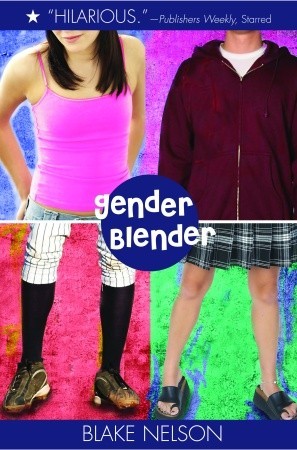
I picked up this book thinking it might be a fun introduction for middle schools discussing gender roles and challenging the societal expectations of gender. What I found instead was a light variation on Freaky Friday.
Emma:Wants Jeff Matthews to notice her.
Hates sexist boys.
Wonders when she’ll get her period.
Tom:
Must avoid looking like a wuss.
Must deal with his blended family.
Must get a chance with Kelly A.
Then something freaky happens: Emma and Tom switch bodies. And until they can find a remedy:
Emma:
Can’t believe she has a . . . thingie.
Hates mean girls.
Finds out secondhand that her period has arrived.
Tom:
Must learn to put on a bra.
Must deal with an overachieving family.
Must not be alone with Jeff Matthews.
The description on the back of the book should have been a clue as to how this novel was handled.
Sixth graders, Emma and Tom, used to be friends but drifted apart as they got older. Emma now tries to balance her high grades, piano lessons, gymnastics team and volunteer work while being a part of the popular mean-girl, boy crazy/boy hating clique. Tom loves baseball, barely tolerates school and hangs out with boys whose main aspirations are to insult girls and brag about their social prowess. After being assigned a gender comparison project and fighting all the time, Emma and Tom somehow switch bodies. While searching for a way to switch back they must experience life as the other gender.The author starts to identify the daily pressures that both genders face from parents, peers, society and themselves. The concept of gender expectations was lightly touched on but quickly fell way to the behaviours of the "mean girl" and "tough jock" stereotypes. I think setup for a more meaningful story was there but somehow even the characters got caught up in repetitive and inane conversations.There is a lack of focus in the story allowing it to skim over deeper issues the main characters Tom and Emma have in their lives. Emma faces high expectations academically and in extra curriculars from her family, over-scheduling and loving but controlled home life. Tom has to deal with an absent father, a distracted mother and a lack of any expectation for success from home or school. Both appear to have friends that are neither supportive or seemingly present outside of the school hallways. With the exception of a few moments between each of the mothers and their body-switched children, this book lacked characters that explored beyond the immediate situation of how Tom would survive Emma's piano lesson or if Emma would be able to pull off baseball tryouts. There was a missed opportunity for all characters to grow during the story, learn from the experience and come away with more than the 'discovery' that peers judge each other on superficial terms. Tom and Emma are both experiencing the changes of puberty and switching physical bodies could have provided a chance for the author to explore a better understanding of themselves and each other and how gender can be a factor in so many aspects of life. Throwing in the odd statement for challenging gender roles, such as boys don't cry or girls are not good at team sports, doesn't serve much purpose unless the characters experience such downfalls and allow the reader share a connection or offer some room to form an opinion. This felt more like an outline for a good story that was never fleshed out and simply left as jumble of stock characters that barely made it to the page.

